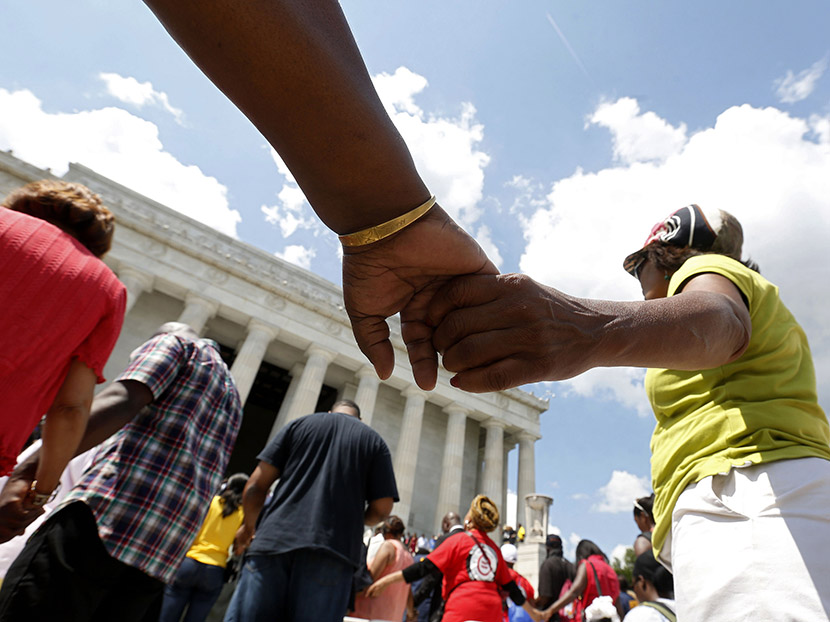WASHINGTON, D.C.—As the crowd of thousands who’d marched down Independence Avenue thinned Saturday, and the news cameras, Civil Rights icons, and dignitaries that drew them had long since gone, two strangers sat together in the shadows of the Martin Luther King Jr. memorial.
One, Jack Jackson, was 69 years old, a former Chicago school teacher who’d driven four hours from Staten Island, New York to be here. He graduated from Morehouse College in 1964, and said he was too poor to attend the original March on Washington a year earlier. But he wouldn’t be missing this one, 50 years later.
The other, Lionell Gaines, was 22, a 2013 graduate of Morehouse who studied political science and made the short commute from across town.
The commemoration of the 50th anniversary of the March on Washington, Gaines said, “is not just important for African Americans, but all Americans.”
As the younger man talked eloquently about the moment, history, the past generation’s fights and the current generation’s ambitions and failings, the older man peered from under a straw hat, one leg over the other.
“It’s all bittersweet,” Jackson said. “Some young brothers are doing so well, doing big important things. But too many other brothers are just dropping out of life.”
In the 50 years since the original march, Jackson said there have been great strides but also great short comings in civil rights. African American unemployment in 1963 was about double that of whites. It’s about the same today. Blacks were fighting hard fought battles for civil rights and voting rights. Those same battles are being waged today. And while education in black households had been seen as integral to the fight for rights and justice, Jackson said it seems that too many young African Americans today are stuck in the muck of low expectations and low performance.
“In a lot of ways I would say we’ve made great strides,” Jackson said, “but it’s a shame we haven’t made more progress.”
“The original march was for jobs and freedom,” Gaines chimed in. “A lot of us have bought into the American dream, but in reality some are more equal than others, have more opportunities and access. In 50 years, some of us have gotten some freedom, but not a lot of us got jobs.”
The older man nodded. Jobs were hard to come by back in his day, Jackson said. His mother worked as a maid in LaGrange, Georgia and was paid $5 or $10 a week. His stepfather worked in a textile factory, and was paid far too little for the blood and sweat he’d spill on the factory floor.
“We weren’t poor,” Jackson said. “We were po. There’s a difference. But there was a lot of love and we stuck together.”
Still, he, his brother and sister all went to college and graduated.
“Morehouse was a savior to me,” Jackson said. “It was either Morehouse or Vietnam. If not for Morehouse I would have probably ended up in the Army because I was poor.”
The two strangers, both Morehouse men , sat in the shadows of the King memorial watching black mothers and fathers and children posing for photos with the sculpture of the great leader rising high in the background. One by one, another stranger would approach, taking notice of the burgundy lanyard dangling from the younger man’s neck or the burgundy ribbon with the word MOREHOUSE in all caps stitched to the older man’s straw hat.
“Class of 2003,” one said, extending his hand and introducing his young daughter.
“Class of 79,” said another.












